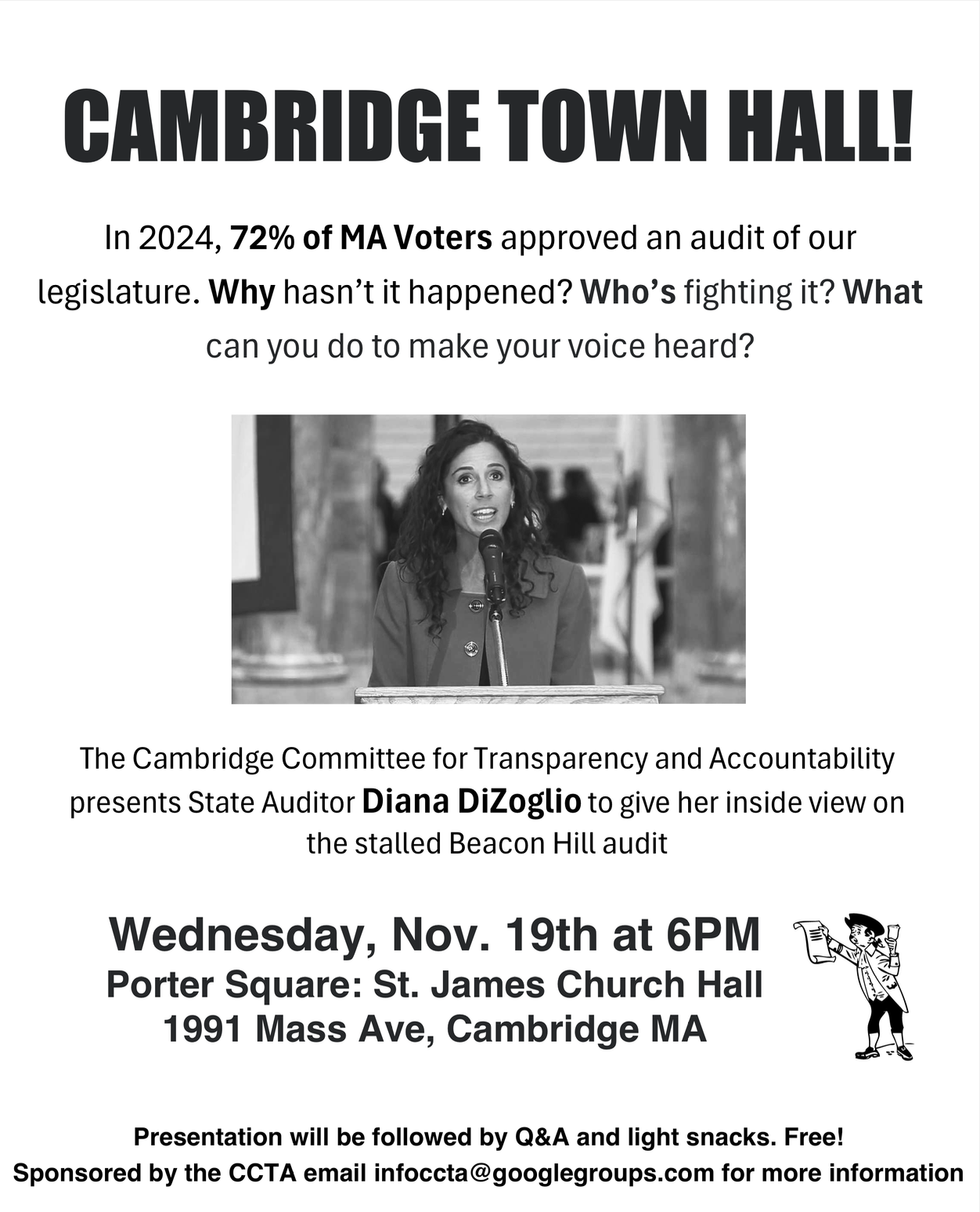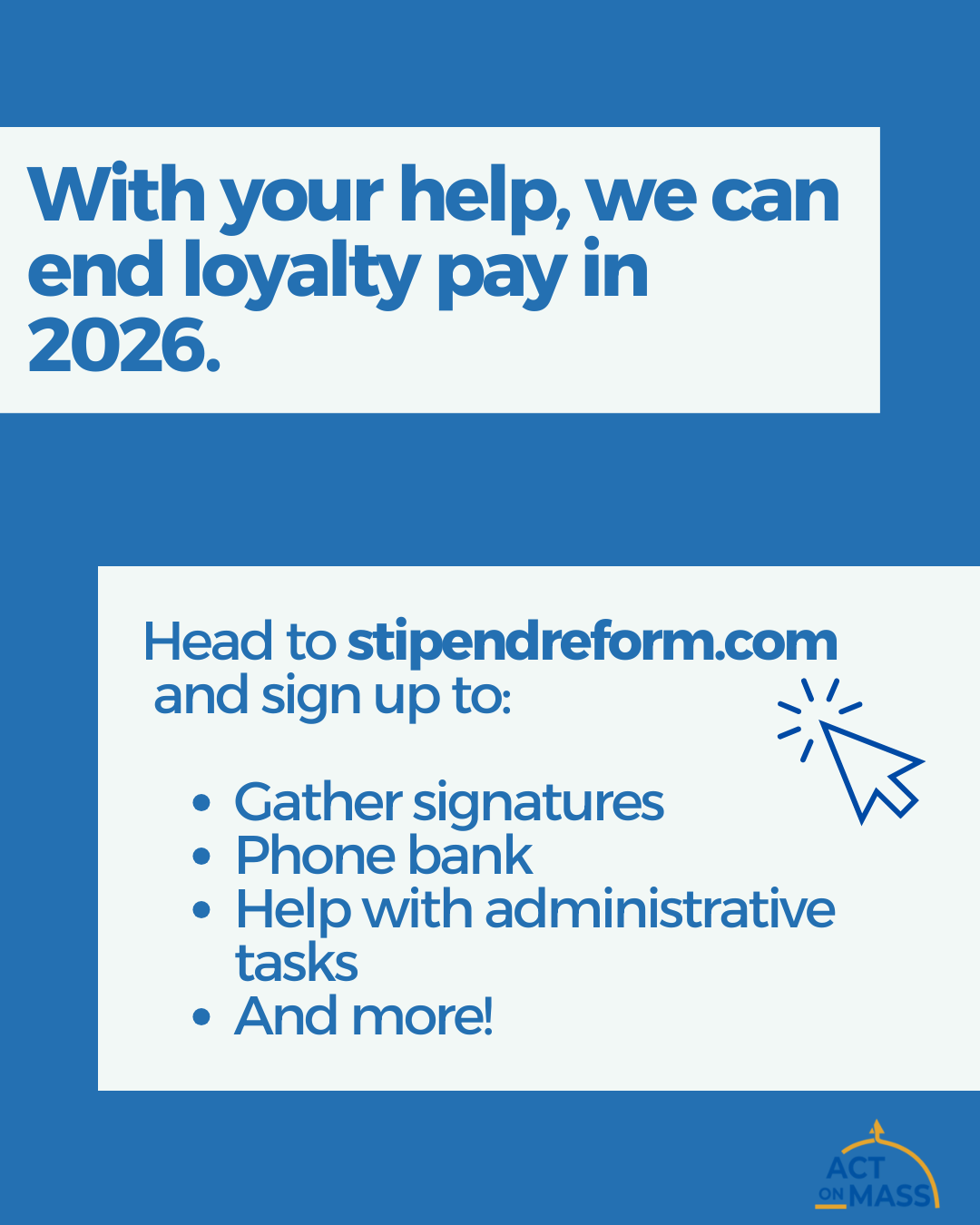Good morning,
This week, we saw firsthand why our yearslong fight to make committee votes public was so important. House members of the Joint Committee on Telecommunications, Utilities, and Energy (TUE) voted Wednesday on a sweeping omnibus energy bill, with less than 48 hours notice. The bill, which did not have a public hearing, would render key tenets of Massachusetts’ climate law “null and void.”
Thanks to transparency changes hard-won by our movement, we knew the committee vote would be public. This allowed for a level of public accountability that we’ve never seen before. Constituents and climate advocates could actually pressure individual legislators to block this legislation, with the knowledge that they would be able to follow up on the result.
Unfortunately, the bill was advanced by TUE on a 7-0 vote, with 4 members “reserving their rights,” which means declining to take a position. Despite the undemocratic process by which this bill was brought forward (and its Trumpian contents!), not a single member voted against it. This remarkable result demonstrates just how much pressure representatives are under to toe the line of leadership.
For today's Scoop, we'll break down this vote and also cover some background. What is this legislation? Who leads this committee? How did we get here?
---
State House Scoop
The Joint Committee on Telecommunications, Utilities, and Energy (TUE): A microcosm of Beacon Hill power dynamics
The Joint Committee on TUE is where climate progress lives and dies in Massachusetts (read: mostly dies), and it is no stranger to political turmoil. Last session, the committee saw a dramatic split between House and Senate members, sparking the unprecedented decision to host two dueling hearings on the same bills. This split led to months of delays on climate action and a chaotic end of session.
Later, it was revealed that then-House chair Rep. Jefferey Roy was in a romantic relationship with a major fossil fuel lobbyist (!!). In the “Old Boys’ Club” of the state house, this revelation didn’t spark reproach from Beacon Hill leadership. Instead, Rep. Roy was promoted this session to House second division chair—a member of leadership and Speaker Mariano’s inner circle. I guess if you’re good enough at networking to snag a romantic partner from the fossil fuel lobby, you’ll be rewarded with (*checks notes*)... more power?
After Roy’s ascension, it might have made sense to select a new chair from the ranks of TUE: someone with familiarity with the specifics of climate legislation and the key players involved. However, that’s not how it rolls at 24 Beacon St. I’ll quote our March Scoop on the topic:
“Having a well-informed membership with specialized policy backgrounds makes it difficult to maintain the sort of tight-grip control that is characteristic of leadership in our Legislature. Informed chairs are empowered chairs. So, leadership has a practice of playing musical chairs with certain favored… well, chairs. This practice ensures that loyal members maintain the same stipends, but interrupts the accumulation of knowledge or informal power. For rank-and-file members, it maintains a system where the path to leadership in your policy area of choice is not through building and exercising expertise in that area, but currying favor with leadership.”
One consequence: inexperienced chairs are also more susceptible to outside influences. For representatives rapidly familiarizing themselves with a new policy area, well-resourced lobbyist firms are more than happy to provide “help,” which could range from one-sided briefings to full bill drafting. This “help” is often paired with well-timed campaign donations.
Enter stage left: brand-new House TUE Chair, Rep. Mark Cusack. A “moderate” Democrat from Braintree, Cusack is an apparent darling of the Speaker and had spent the past several sessions as House Chair of the Joint Committee on Revenue. Since taking control of TUE, he’s stayed far away from action on energy affordability and out of the headlines until… last week.
TUE Chair Rep. Mark Cusack explains: “Trump said no more climate progress, so we had no choice but to change Massachusetts law to get rid of it” (paraphrase)
Remember a few weeks ago, when we discussed the coming winter and the failure of state leaders to act on energy affordability amid skyrocketing costs?
Last week, Chair Cusack announced plans to finally act and push a redraft of Healey’s energy affordability bill through the House before the end of formal sessions. Major caveat: Cusack also indicated his intention to use this legislation to roll back the state’s 2030 emissions reduction goals, drastically altering Massachusetts’ climate laws. His explanation was that changes in federal policy have made reaching MA’s goals too difficult.
The 98-page omnibus bill was released by the Chair on Monday, to be voted on by 4 p.m. Wednesday. Representatives were out of the office Tuesday for Veteran’s Day. That means rank-and-file members of the committee had less than a full day, amid holiday celebrations, to read and review the enormous bill.
And what a bill! Although the full text of the legislation has yet to be made publicly available, a detailed summary was put out to the press (14 pages itself!) The bill proposes to:
- Make Massachusetts’ 2030 greenhouse gas targets "advisory" rather than enforceable– rendering the bedrock of our climate law "null and void"
- Reduce Mass Save’s budget by $330 million and eliminates a new program providing discounts for moderate incomes
- Add incentives for natural gas heating
- Even more MAGA lite stuff – check out the Acadia Center’s release for more information
According to our allies in the climate movement, the draft legislation appears to have been at least partially writtenby fossil fuel lobbyists.
Chair Cusack also employed some dubious tactics to push this bill forward. Although the bill was pitched as a redraft of Healey’s energy bill, it was given the number of a different House bill on solar that he had filed. By associating this omnibus bill with a House-filed bill rather than one filed by the Governor, House members could (per new rules) vote it out without support from the Senate. And: by tacking on the language dismantling our climate law to an unrelated bill, these changes could be moved through without a public hearing.
Like clockwork, on the day of the vote, Chair Cusack received 18 individual campaign donationsfrom National Grid and various lobbying groups that work on energy policy, each $200+.
If passed by the House, this bill would be a major win for the fossil fuel industry– the same billionaire oligarchs that are now given veto power over our national climate policy via the Trump administration’s bespoke corruption agenda. It was pushed through via anti-democratic means, at a time when state climate leadership is more important than ever. How can we stop it?
It's time for public pressure: Reps need empowerment to buck Beacon Hill power dynamics

Let’s start with the good news: House leaders are clearly on the defense with this legislation. Under Beacon Hill status quo, it can be assumed that a bill approved by the chair will have a unanimous vote in favor. Yet, with tremendous public pressure and the knowledge that their own vote would be public, we saw four representatives buck leadership and refuse to vote in favor.
Look, I’m not cheering too loud– they still could have voted “no.” “Reserve rights” are not counted in a tally, so it cannot block the bill. Still, it was a rare sight and is a glimmer of dissent that we can build on as the bill progresses through the House.
What about the seven that voted in favor? It seems that Beacon Hill power structures were invoked explicitly to make sure this bill passed through committee. According to rumors, Chair Cusack told TUE members that if they voted against the bill, he would make sure that any amendments they filed to the bill on the floor would be unsuccessful.
If we had a functional, democratic legislature, this would be an empty threat. Obviously, if a majority of the committee had organized themselves against the bill, the bill would have stopped there and there would have been no need for amendments. In the worst case, the punished representatives could build support from their colleagues to ensure that their amendments pass on the floor– even without leadership’s support.
Yet, with 68% of the House dependent on the Speaker for their salaries, leadership can crush an amendment if they want to. This gives teeth to Cusack’s threat– as long as the Speaker goes along.
The seven representatives that approved this bill should be held accountable for the vote they took (especially if they're your representative!) Others proved that more bravery is possible. Still, it's important to acknowledge the perverse incentive structures they're up against. This also givesus some tools to stop this legislation and others like it in the future.
First of all, representatives know that this legislation is unpopular. The bill will pass to House Ways & Means next and could be voted on by the full House as soon as next week. Your representative needs to hear from you, today, and tomorrow, and probably Monday and Tuesday: We will hold you accountable for your vote. Massachusetts cannot cave to Trump and his oligarch cronies. If you fear punishment from Beacon Hill leadership, we will have your back. Do not support this legislation.
Here are some key actions we can take this week, from our friends at MA Sierra Club:
- (Re-) Call/email your MA State House Representative (form email, toolkit) and tell them to reject the energy bill. If you already have, please do it again!
- Share this excellent video on your social media!
- Send written testimony (form email, toolkit) in support of H.3547/S.2290 An Act preventing gas expansion to protect climate, community health and safety.
- Share information about this anti-democratic bill with your networks.
It seems so far that the major proponents behind this legislation are Cusack and his fossil fuel backers; the Speaker has neglected to publicly give his support.
We know that public pressure was enough to convince two Democratic committee members to reserve their vote. If enough representatives complain to the Speaker that they’re being put in a tough spot with their constituents, leadership could delay the vote, block it entirely, or remove the anti-climate sections.
As I plan my calls to my own representatives, I am keeping the real tragedy in mind: constituents desperately need relief on energy costs. My roommates and I were among thousands of other Bay Staters who turned on our heat this month and started bracing for the bill. In linking necessary cost relief to these toxic climate setbacks, the elites in our legislature reveal just how out of touch they are with the average MA resident.
It’s also why everything ties back to reform. We need a legislature where rank-and-file representatives can vote proudly and openly against bad faith tactics. We need a legislature that is more responsive to constituent needs than well-timed lobbyist donations. For that, we need stipend reform on the ballot!
It’s the last weekend for collecting signatures and we’ll soon know if we’ve advanced to the next step for the ballot in 2026. If you have sheets to turn in, please send them into the campaign ASAP. And if not, stay tuned for an update soon!
Finally: please take some time to let your representative know that you oppose this climate rollback legislation and that you’ll be paying attention to their vote as this bill proceeds. Transparency is power and we saw that loud and clear this week. Let’s keep the pressure up!
TELL YOUR REP: WE CAN'T CAVE ON CLIMATE>>
---
Syd's Sprinkles
Syd’s Sprinkles: Update on Healthcare in Massachusetts
Now that the federal shutdown is over in D.C., some of the uncertainties that we were left on the table are becoming a bit more certain… and not necessarily in a good way.
One area of concern here in Massachusetts is healthcare funding. Prior to the government shutdown and attempts at the federal level to completely overhaul Medicare and Medicaid, Massachusetts’ health care system was already facing some hardship.
Right now, the state is facing massive cuts to enrollment and to funding for healthcare, specifically when it comes to MassHealth – a.k.a. a combined program for Medicaid and the Children’s Health Insurance Program (CHIP) in Massachusetts.
Three seems to be the magic – or maybe cursed – number.
CommonWealth Beacon reported that “About 300,000 Bay Staters are expected to lose coverage through MassHealth, the state Medicaid program, or the Massachusetts Health Connector marketplace over the next decade, according to state data cited by Blue Cross Blue Shield of Massachusetts Foundation president Audrey Shelto.”
In addition to this, another “300,000 residents face higher premiums starting in 2026 for insurance they get through the Health Connector because of expiring federal tax credits.”
All of this, on top of other hits to healthcare in the state, poses a scary future for Bay Staters.
With Massachusetts already driving out long-time Bay Staters due to rising costs of living, solutions to the cost of living crisis are essential.
What we need now is immediate, direct action at the state level so that Massachusetts residents do not have to decide between addressing immediate health concerns and staying out of debt.
---
Worth reading: more stories from this week
Some other stories from this week relative to our state and our region:
- Act on Mass featured: DiZoglio’s effort to audit the Legislature remains stalled. So she wants voters to change the law, again. by Chris Lisinski for Commonwealth Beacon
- Amid an ICE crackdown, fears grow of a ‘school-to-deportation pipeline’ by Marcela Rodrigues and Lea Skene
- Municipalities warn Beacon Hill they’ll need to slow down solar projects due to state limit by Jordan Wolman, Commonwealth Beacon
- Why the middle class is disappearing in Massachusetts by Esmy Jimenez, Aaron Pressman, and Mara Kardas-Nelson for Boston Globe
---
Missed a Scoop or two? You can find a full archive of all past Saturday Scoops on our blog.
---
Take Action
Boston area: upcoming event with the State Auditor! Nov 19th, 6 pm in Cambridge

Where's our audit? Our allies in the Cambridge Coalition for Transparency and Accountability (CCTA) are hosting an event with Auditor Diana DiZoglio this month in Cambridge! Join for the inside scoop on the long-delayed legislative audit. RSVP here:
JOIN CCTA & AUDITOR DIZOGLION ON NOV 19>>
Take action to get stipend reform on the ballot!

We are a month out from our deadline to get 75,000 signatures! Help us get across the finish line by pitching in in your own community.
PITCH IN TO GET STIPEND REFORM ON THE BALLOT>>
---
Thanks for reading, have a great weekend!
In solidarity,
Scotia
Scotia Hille (she/her)
Executive Director, Act on Mass
